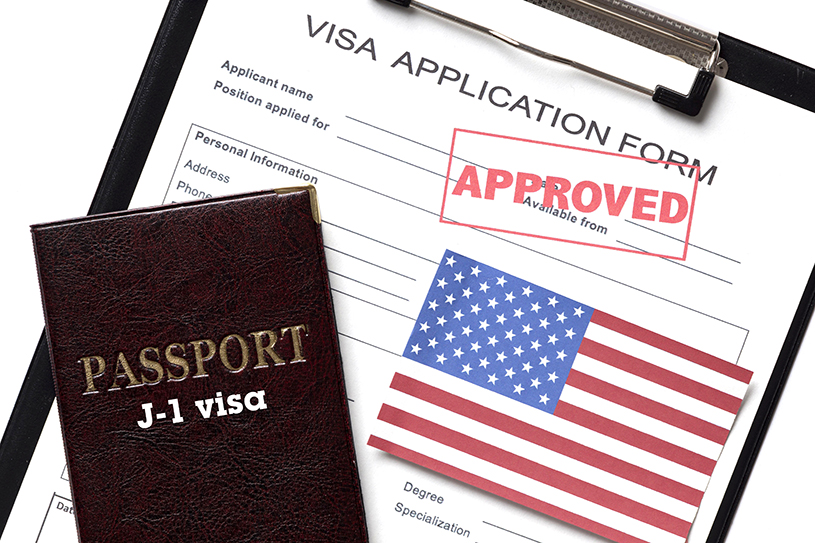Justifying a J-1 visa. Is it better than an F-1 student visa?

Many folks know about the F-1. The F-1 is the most common student visa to study in the United States as an international student. However, there are other options to study in the States. M-1 visas can be used to study a short term program such as a certificate or training program at a technical school or college. But what is the J-1?
The J-1 visa is actually part of the U.S. State Department’s official visitor exchange program. Instead of dealing with the USCIS, you actually deal directly with the Department of State. The purpose of the J-1 is to “promote interchange of persons, knowledge, and skills, and the interchange of developments in the field of education, the arts and sciences.“.
Because there has to be an “interchange of knowledge”, J-1 visa holders are typically required to return to their home country for at least 2 years before returning to the United States.
Why do they have to go back home? Well, the main justification for the J-1 visa is to exchange ideas between visitors of other nations. If the J-1 holder simply stays here in the States they arguably can never directly share their knowledge and experiences with their home country. This limitation is usually marked on the bottom of the J-1 visa saying “subject to 212(e)”. Now the 2 year foreign residency requirement doesn’t have to be 2 consecutive years but it has to total at least 2 years in the aggregate.
My brother in law is a professor and researcher at a top U.S. University. His STEM lab typically employs postdocs or students who have already earned their PhDs. A postdoc is a great way to start your own professional research or teaching career and at the same time build up your O-1 visa or EB-1A green card profile. The vast majority of his postdocs are international students and many of them obtain J-1 visas.
What are the main advantages of a J-1 visa?
- You don’t have to be enrolled in a degree seeking program like a Master’s or PhD.
- You don’t have to complete a labor condition application (LCA) like a H-1B visa.
- You can get a J-1 visa much faster and much cheaper than an H-1B visa and there is no lottery or annual cap.
- Spouses or dependent children of J-1 visa holders can work unlike those who are dependents of H-1B visas (in H-4 status).
What are the main disadvantages of a J-1 visa?
- The 2-year foreign residency requirement
- J-1 researchers and professors are only admitted up to 5 years (often less). Where an F-1 student researcher can have lawful admission as long as they are enrolled in a full-time program and can extend their F-1 status with 1-3 years of Optional Practical Training (OPT).
- A J-1 visa is not a dual-intent visa (like the H-1B or the L-1) meaning you can not easily adjust your status to a green card while in J-1 status.
If you are considering a J-1 visa or your program offers you a J-1 you need to fully understand the consequences of 212(e)’s two-year foreign residency requirement. You need to go into your J-1 program with your eyes open about this 2 year rule. It is possible to apply for a waiver of the 212(e) rule but these waivers take time and are challenging to get approved. Therefore if you want to apply for a waiver of the 2-year foreign residency requirement of the J-1 visa you should contact an immigration attorney with experience in waivers.
Do you have to be a researcher or professor to get a J-1 visa? No. Are you aware that au pairs often can get a J-1 visa but these usually last only 1-2 years. While au pairs are eligible to work on their J-1 visa, they are expected to learn American English and culture and then return home to their home countries with that knowledge. There are many possibilities for a J-1 visa but they have to still qualify for the visitor exchange program. Could a K-pop band like Black Pink get a J-1?
A creative attorney could make an argument that a foreign band like BlackPink could remain in the United States on an extended stay, possibly in a Las Vegas Residency, entertain Americans while at the same time learning English and studying American music and culture. The ladies of BlackPink (Jisoo, Jennie, Rosé, and Lisa) could then go back to South Korea and promote and share their knowledge of American music, language and culture with their home nation. What about the possibility of a Bollywood producer or actor justifying a J-1?
While the J-1 visa offers unique advantages over the more common F-1 student visa, such as faster processing and broader eligibility beyond degree-seeking programs, it comes with significant constraints, notably the two-year foreign residency requirement. This requirement underscores the visa’s primary goal of fostering international exchange, mandating that participants return home to share their acquired knowledge. For researchers, professors, and even entertainers like BlackPink, the J-1 visa provides a platform to contribute to American society while enriching their home countries upon their return. Despite its limitations, the J-1 visa remains a pivotal tool in promoting global cooperation and cultural exchange through education, arts, and sciences.
This article does not constitute a solicitation or provision of legal advice and does not establish an attorney-client relationship. The answers provided should not be used as a substitute for obtaining legal advice from an attorney licensed or authorized to practice in your jurisdiction. You should always consult a suitably qualified attorney regarding any specific legal problem or matter on time.
About the Author:
 U.S. Immigration Attorney Seth Finberg is a 2005 graduate of the University of Georgia School of Law. Seth is a member of the Georgia Bar and the American Immigration Lawyers Association (AILA). Mr. Finberg is the owner and founder of South Florida based Finberg Firm PLLC and he represents clients nationwide and internationally in business, employment, and investment immigration. He can be reached by phone at (305)-707-8787 or by email at info@finbergfirm.com or visiting www.finbergfirm.com.
U.S. Immigration Attorney Seth Finberg is a 2005 graduate of the University of Georgia School of Law. Seth is a member of the Georgia Bar and the American Immigration Lawyers Association (AILA). Mr. Finberg is the owner and founder of South Florida based Finberg Firm PLLC and he represents clients nationwide and internationally in business, employment, and investment immigration. He can be reached by phone at (305)-707-8787 or by email at info@finbergfirm.com or visiting www.finbergfirm.com.




























